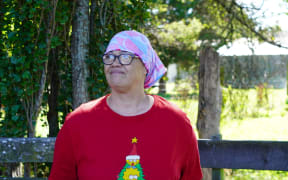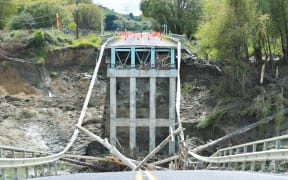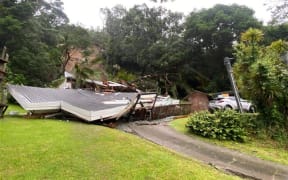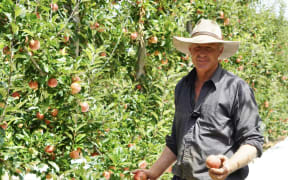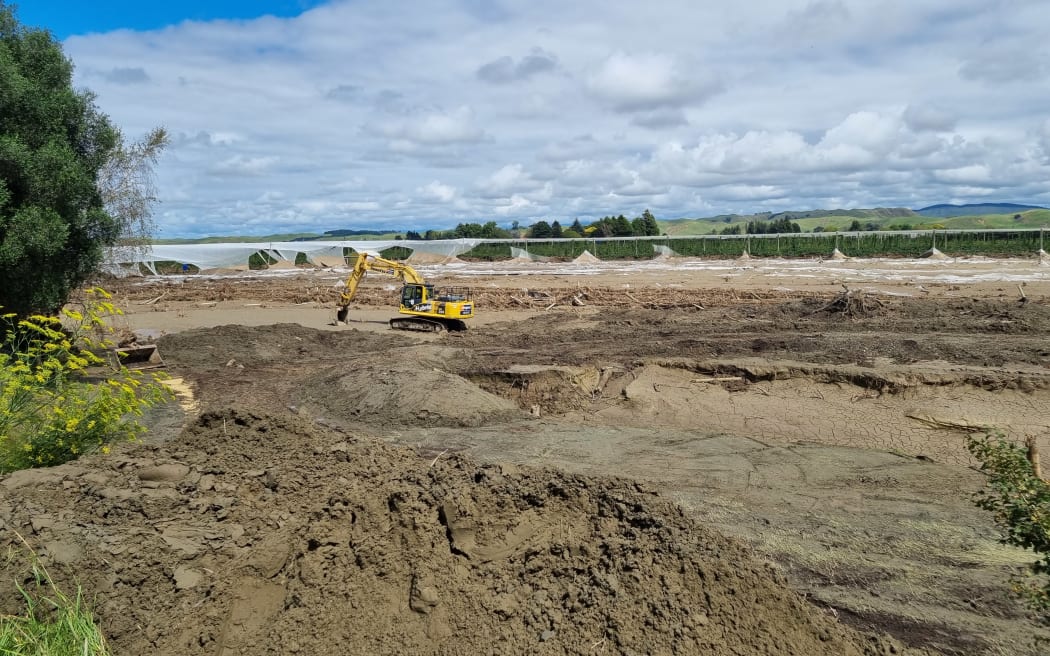
Entire orchards of crops such as kiwifruit were wiped out by the flooding and slips that Cyclone Gabrielle brought to Hawke's Bay. Photo: RNZ / Lauren Crimp
Viewed from an aeroplane on a clear day, the hills of Hawke's Bay are scarred by hundreds of brown gouge marks.
Local musician Riqi Harawira described those scars on Te Mata Peak in the days following the cyclone: "The maunga was crying".
The slips are a reminder of how the land crumbled under the weight of the water that thrashed down on 14 February, 2023.
In suburban areas, away from the rivers that swelled, burst and broke through homes that night, there's barely a sign of Cyclone Gabrielle. The regional tourism body cried out for visitors as early as April, telling Aotearoa that Hawke's Bay was open for business.
But the scars are still deep in the rural areas - and are not just borne by the land, but by those who fled it with just the clothes on their back, plucked from rooftops and trees by helicopters and IRBs.
'My soul's here'
They're still displaced. Some might consider themselves displaced forever, unable to return to their true homes, where their hearts are.
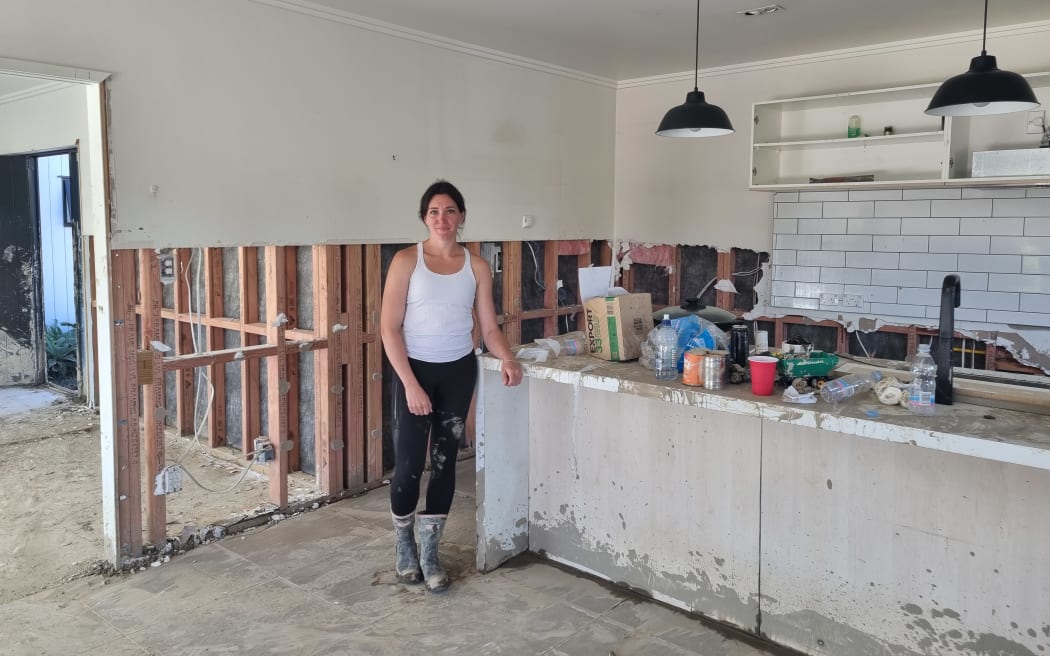
Danelle Kendrick in her ruined home in March last year. Photo: RNZ / Lauren Crimp
"My soul's here," said Danelle Kendrick, of her coastal Whirinaki home soon after floodwaters rushed through in the small hours of 14 February.
It's now in category 2C - the property will be safe and liveable once more, but only once a new stopbank is built and nearby State Highway 2 raised. It's unclear how long that will take.
Thousands of others are in a similar boat. A year on, it's still a waiting game: waiting for flood protection, waiting for insurance, waiting for repairs. Meanwhile, living with friends, or on marae, or in caravans.
Across Hawke's Bay, 287 homes are no longer safe to live in, because the risk to life is too high.
The voluntary buyout process began late last year, and two homeowners have settled so far. A further six have approved offers, and another 28 offers are underway.
There are plans to change council rules to allow landowners near Category 3 land to subdivide and sell to those who were displaced - because most want to remain as close to home as they can.
It's a different story for whenua Māori - that buyout process is being run by central government, and there's still no clear direction.
"The process has been too slow," Ngāti Kahungunu chair Bayden Barber said he told the Prime Minister.
"Speed it up."
Growing pains
While people's lives were tipped upside down, so too was the fruit bowl of New Zealand. It's estimated a third of Hawke's Bay's crops were affected.
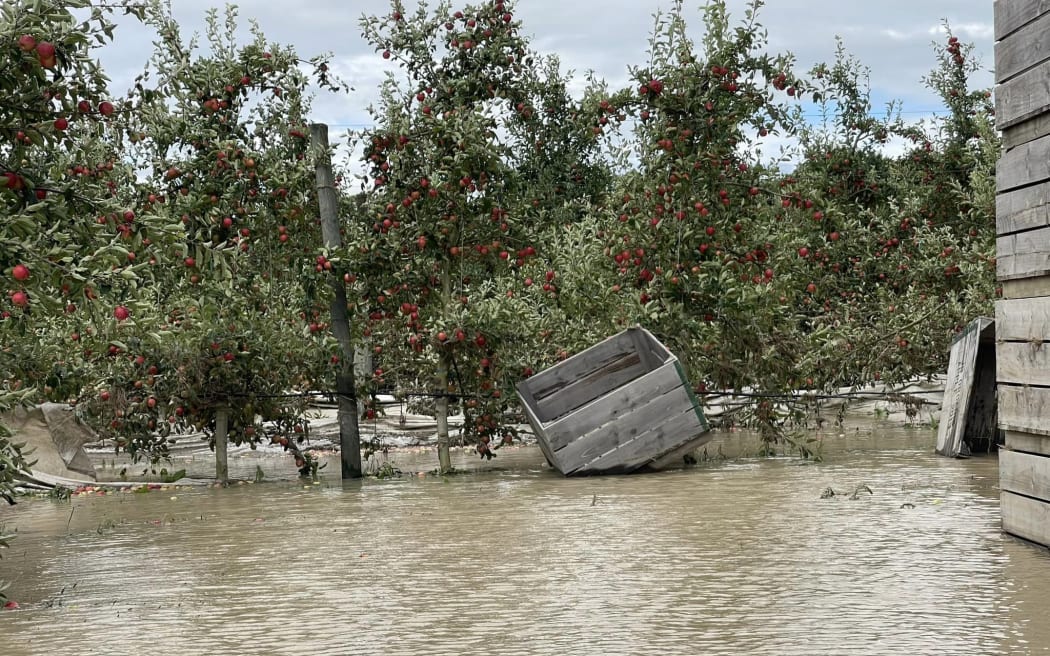
A flooded Hawke's Bay orchard after Cyclone Gabrielle. Photo: Supplied / Catherine Wedd
Despite some produce disappearing from the supermarket shelves for a short while - apples, most recently - and silt still blanketing productive land, the industry is bouncing back.
In Puketapu, Brydon Nisbet's apple orchard is full of pops of red.
He said it was heartening how the trees and orchardists had been more resilient than what was once thought in the days and weeks following the disaster.
On the whole, the industry has weathered the storm, and will still deliver what New Zealand needs.
But not everyone.
"Some of them have walked off their land, they've had to walk off their land, their orchards have been totally destroyed, their houses have been destroyed."
And many of those still standing were drowning in debt - some, for the rest of their lives, passed on to children who take over the family business.
Local government is also drowning, because the infrastructure rebuild ahead is staggering.
Hastings district - home to most of the damage - is tackling $800 million of road repairs. The government has funded a quarter of that, and the rest is up to ratepayers so far.
"The burden is enormous," said mayor Sandra Hazlehurst.
Puketapu North and South
But it's not just about the money. Roads connect communities - and some, like Puketapu, are now divided, after the bridge over the Tuataekurī river was destroyed.
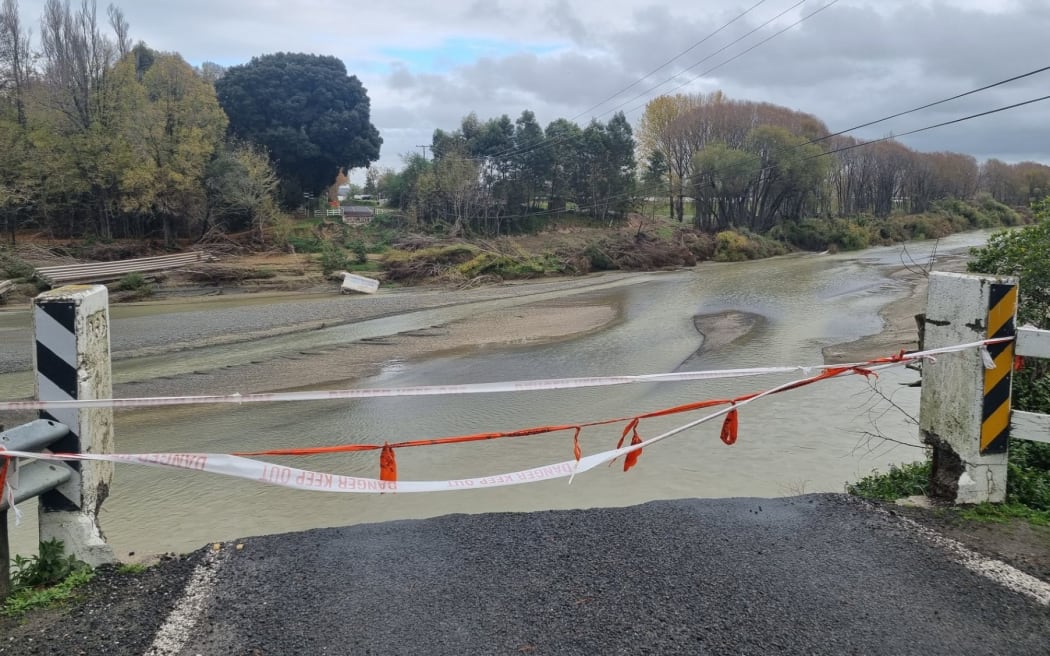
Puketapu bridge in Hawke's Bay - swept away in Cyclone Gabrielle. Photo: RNZ / Lauren Crimp
Puketapu North and South, they call themselves. What was a five minute drive down the road now takes an hour. And it takes a toll, on those who no longer have nearby neighbours.
"They've got nobody to talk to. The communities are decimated, so you drive up the road at night and there's no lights on in the valleys anymore," local Lesley Wilson told RNZ last year.
The new bridge is still about 18 months away and emotional batteries are running low.
Counselling appointments are through the roof, Napier Family Centre chief executive Kerry Henderson told RNZ.
And there's a spike each time it rains heavily, with the centre now having a dedicated counsellor for cyclone-related trauma.
But throughout the year, communities have strengthened - because they've had to.
'The very, very best of NZ'
Over the weekend, Prime Minister Christopher Luxon addressed a crowd of volunteers and first responders at an event held to honour their efforts.
"Last year we saw some real challenges in this region," he said.
"But man, we saw the very, very best of New Zealand as well."
A handful of reports are due out soon that will poke and prod into different aspects of 14 February and beyond: a national emergency management inquiry, an inquiry into the civil defence response in Hawke's Bay, and a look at how the region's flood protections assets stood up - or didn't.
They may provide some answers, or comfort, or at least a better understanding of how things got so bad, so fast.
But that's not what today is about.
Today, the community will mourn the loss of loved ones, homes, and livelihoods. The lives they once had, that have been changed forever.
But they will also reflect on the way they have held each other up through dark days. The offers of a cup of tea, a bed, a meal, or a hand shovelling silt.
The very best of New Zealand, indeed.

